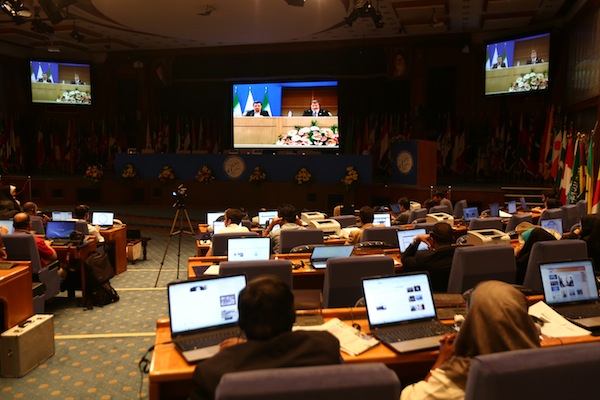It is not uncommon for new leaders of new nations to flex their muscles. And in spite of its millennia of history as a nation, this is precisely where Egypt now finds itself. It has hosted its first free and fair democratic elections, and, for the first time, has a civilian occupying the Presidency. In this new nation, reborn for the umpteenth time, Mohamed Mursi is busy showing off the Brotherhood’s sinews.
He landed in Tehran today, a move the Ahmadinejad government had touted as a diplomatic coup. No Egyptian leader has visited the country in more than three decades, and relations have been little more than frosty at the best of times. But as I suggested on Coffee House last week, Mursi was not headed there to prostrate himself before the Ayatollah’s authority. That was a gross miscalculation by Ahmadinejad.
Speaking at a conference of the Non-Aligned Movement, Mursi took to the stage in expansive form. After starting his speech in distinctly Sunni terms, by offering blessings for the Prophet Mohammed, he proceeded to lambast the ongoing crackdown in Syria. ‘Our solidarity with the struggle of the Syrian people against an oppressive regime that has lost its legitimacy is an ethical duty,’ he said.
Had he stopped there it would have been bad enough, but Mursi pushed on. ‘We all have to announce our full solidarity with the struggle of those seeking freedom and justice in Syria.’ This will come as a massive embarrassment to Ahmadinejad who is Bashar al-Assad’s biggest supporter, and is the only regime in the regime in the region to have backed the brutal crackdown in Syria. Indeed, without Iranian support it is likely Assad’s government would have already crumbled.
In a sign of just how emboldened Mursi has become despite his time in power, he pressed on to undermine the very platform on which Ahmadinejad has staked his regional reputation. The Syrian uprising, Mursi insisted, is akin to the Palestinian struggle for ‘freedom, dignity, and human justice’.
Iran’s Supreme Leader, Ayatollah Ali Khamenei, spoke on his country’s behalf but ignored the Syrian crisis altogether. Instead, he touched on the boilerplate issues of Iranian concerns: its nuclear programme, American support for ‘ferocious Zionist wolves’, and how Iran will soon create a new world system.
The Palestinian cause is a cornerstone of Iranian foreign policy and Mursi would not have linked it to the Syrian uprising unintentionally. This was a demonstration of both mischief and muscle by the Egyptian premier, who appeared to revel in the delicious dissonance of saying all this on Iranian soil. Ahmadinejad will surely be regretting the decision to have invited him now, and any expected thawing in Iranian-Egyptian relations remains a long way off.






Comments